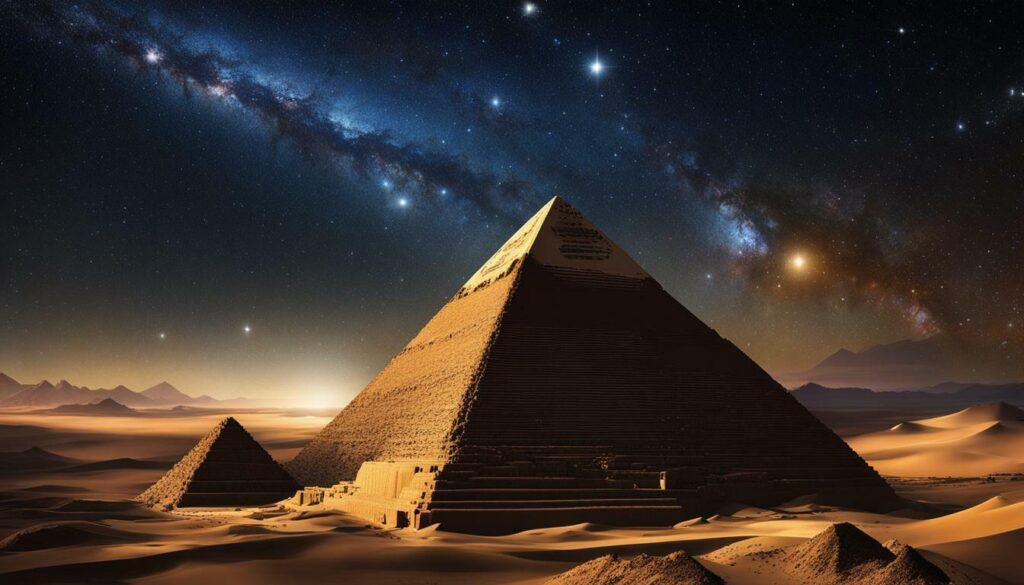Welcome to our journey through the celestial beliefs of ancient Egypt. The ancient Egyptians had a deep fascination with the stars, planets, and other celestial bodies. These phenomena were not only important in their religion and daily life but also played a significant role in their cosmology and astronomy.
From aligning their temples with celestial events to using celestial knowledge in agriculture and navigation, the ancient Egyptians had a unique relationship with the cosmos. Join us as we explore their celestial beliefs and practices and delve deeper into the mysteries of ancient Egyptian civilization.
- Celestial beliefs and practices deeply influenced ancient Egyptian culture.
- Their cosmology and astronomy were centered around celestial bodies like stars, planets, and constellations.
- Celestial deities played an important role in their religious practices and mythology.
- Ancient Egyptians used celestial knowledge in various aspects of daily life, such as agriculture and navigation.
- The alignment of temples with celestial events highlights the significance of these phenomena in ancient Egyptian religion.
Ancient Egyptian Cosmology and Astronomy
Ancient Egyptian cosmology and astronomy were closely intertwined. The ancient Egyptians developed a unique understanding of the universe that was heavily influenced by their observations of celestial bodies.
According to ancient Egyptian cosmology, the universe was divided into two parts: the sky and the earth. The sky was believed to be a vast, solid dome that arched over the earth, with the sun, moon, stars, and planets embedded in it.
The ancient Egyptians observed and recorded the movements of celestial bodies, which allowed them to develop a basic understanding of astronomy. They created a calendar based on the moon’s cycles and the stars’ rising and setting. They also used astronomical observations to predict the flooding of the Nile, which was crucial for their agricultural practices.
Ancient Egyptians believed that certain celestial bodies held great power and significance. The sun was one of the most important celestial bodies, and it was worshipped as the god Ra. The moon was also significant and was associated with the goddess Isis.
Ancient Egyptians’ understanding of the universe and their ability to observe and record celestial phenomena was a testament to their advanced knowledge and scientific prowess.
The ancient Egyptians believed that the universe was created by the god Atum, who emerged from the waters of chaos and created the world by speaking it into existence. They also believed in a number of other deities associated with the sky, including Nut, the goddess of the sky, and Horus, the god of the rising sun.
Ancient Egyptian astronomy was essential not only for their religious practices but also for their practical daily activities. They used their knowledge of astronomy to navigate the Nile and the deserts, to track the seasons, and to plan their agricultural activities.
The ancient Egyptians believed that the stars and planets could influence human destiny, and they were interested in predicting celestial events. For example, the appearance of the star Sirius, known as the “dog star,” was believed to signal the beginning of the annual flooding of the Nile.
Ancient Egyptian astronomy also influenced the design and orientation of their buildings. For example, the Great Pyramid of Giza is aligned with the true north and is oriented to the movements of the sun and stars.
In conclusion, ancient Egyptian cosmology and astronomy were closely intertwined and played a vital role in the religious practices, daily activities, and architectural design of the ancient Egyptians. Their observations and interpretations of celestial phenomena were a testament to their advanced knowledge and scientific achievements.
Worship of Celestial Beings in Ancient Egypt
The worship of celestial beings was an integral part of ancient Egyptian religious practices. Celestial gods were believed to have immense power and influence over the fate of humanity. The ancient Egyptians attributed different meanings and symbolism to various celestial bodies, including the sun, moon, stars, and planets.
The worship of celestial gods was often tied to the calendar. Many ceremonies and festivals were held in honor of celestial phenomena, such as the annual flooding of the Nile River, which was believed to be caused by the star Sirius rising in the eastern sky.
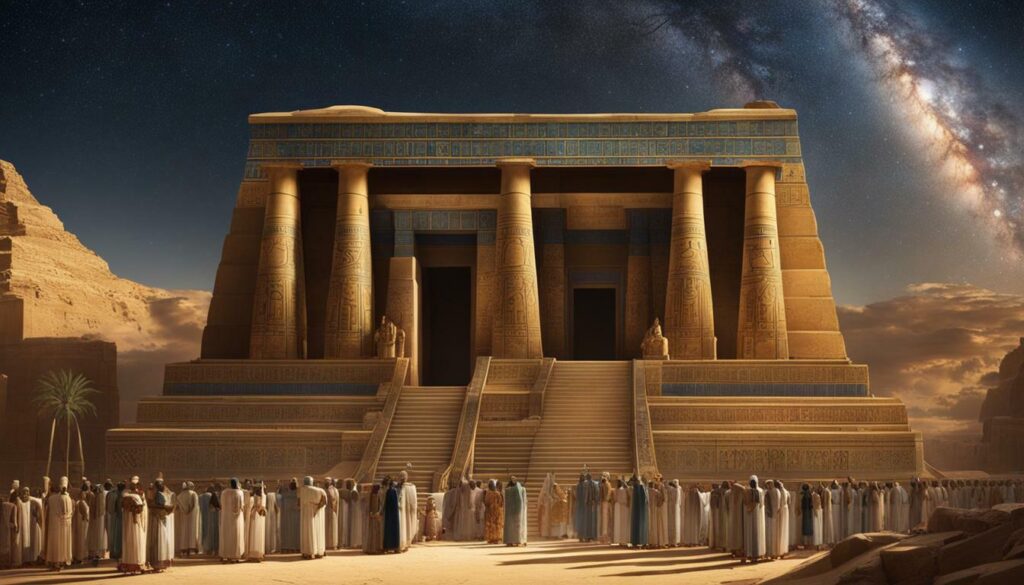
The ancient Egyptians believed that celestial gods could intercede on their behalf and protect them from harm, bringing blessings and good fortune. They also believed that these gods could grant the living eternal life after death.
“The gods of the heavens are powerful and mighty, and all the people should worship them and give them offerings.” – Ancient Egyptian religious text.
The worship of celestial beings was not exclusive to the elite. Commoners also worshipped these gods and often had personal shrines in their homes. The celestial deities also had temples dedicated to them, such as the Temple of Hathor, the goddess of the sky and love, located in Dendera.
In conclusion, the worship of celestial beings was an important aspect of ancient Egyptian religious practices. The belief in celestial gods and the power of celestial phenomena played a significant role in their daily lives and rituals.
Ancient Egyptian Astrology
Ancient Egyptian astrology was an important part of their belief system, and their understanding of the stars and planets helped shape their lives and destinies. The ancient Egyptians believed that the stars and planets represented powerful deities and that their movements could affect the lives of humans on Earth.
“As above, so below” was a common phrase among ancient Egyptian astrologers. This meant that they believed that the movements of celestial bodies were reflected in the events on Earth and that by studying these movements, they could predict future events.
Astrology was used for a variety of purposes in ancient Egypt. It was used to predict the future, to understand personal characteristics and destinies, and to determine the best time for important events such as marriages and coronations.
“Astrologers were highly respected members of ancient Egyptian society, and their knowledge was highly sought after by pharaohs and commoners alike.”
The ancient Egyptians believed that each person was born under a specific star sign, which influenced their personality and life path. These star signs were associated with specific deities, and understanding one’s star sign was considered essential for making important life decisions.
Ancient Egyptians also used astrology for medical purposes. They believed that the movements of the stars and planets could influence a person’s health and that specific celestial events caused certain illnesses or conditions.
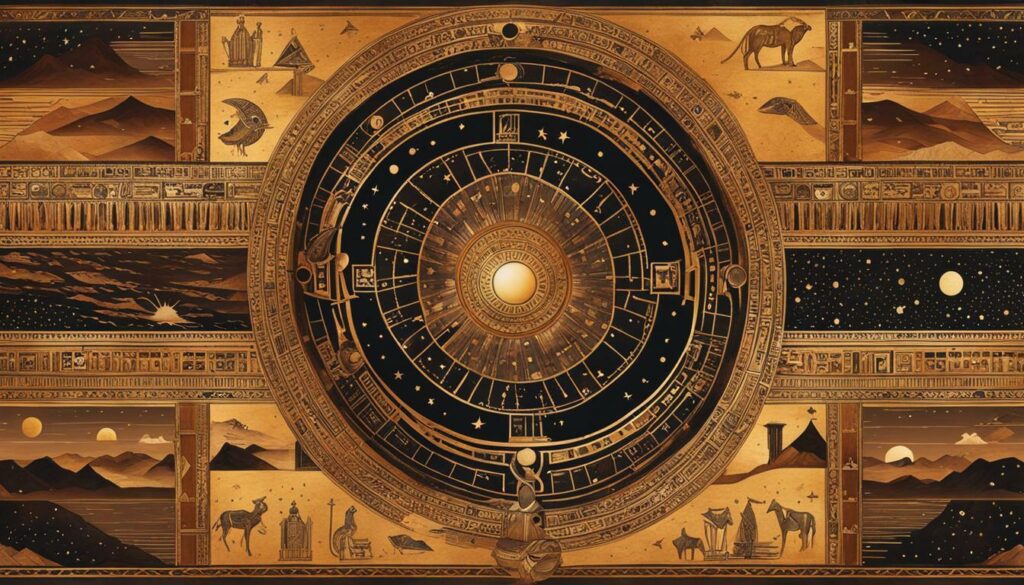
Overall, ancient Egyptian astrology was a complex and important part of their belief system. It helped them understand their place in the universe, predict future events, and make important life decisions. Today, the legacy of ancient Egyptian astrology lives on in modern astrology and horoscopes.
The Significance of Stars and Planets in Ancient Egyptian Culture
Ancient Egyptians had a profound belief in the transformative powers of stars and planets. They believed that these celestial bodies had immense power to shape human destiny and the world around them.
The stars and planets were viewed as powerful symbols of divinity and were revered in ancient Egyptian culture. They were associated with gods and goddesses, each with their own unique mythology and symbolism.
Ancient Egyptians believed that the stars and planets were a reflection of the divine order of the universe. They believed that by studying these celestial bodies, they could better understand the gods and the nature of the universe.
The ancient Egyptians also believed that the stars and planets had an important role in their daily lives. They used celestial observations to determine the season and the time of the year. They also used the stars to guide them in navigation and to predict the weather.
An important aspect of ancient Egyptian culture was the creation of astronomical calendars. These calendars incorporated celestial observations and were used to mark important religious festivals and events.
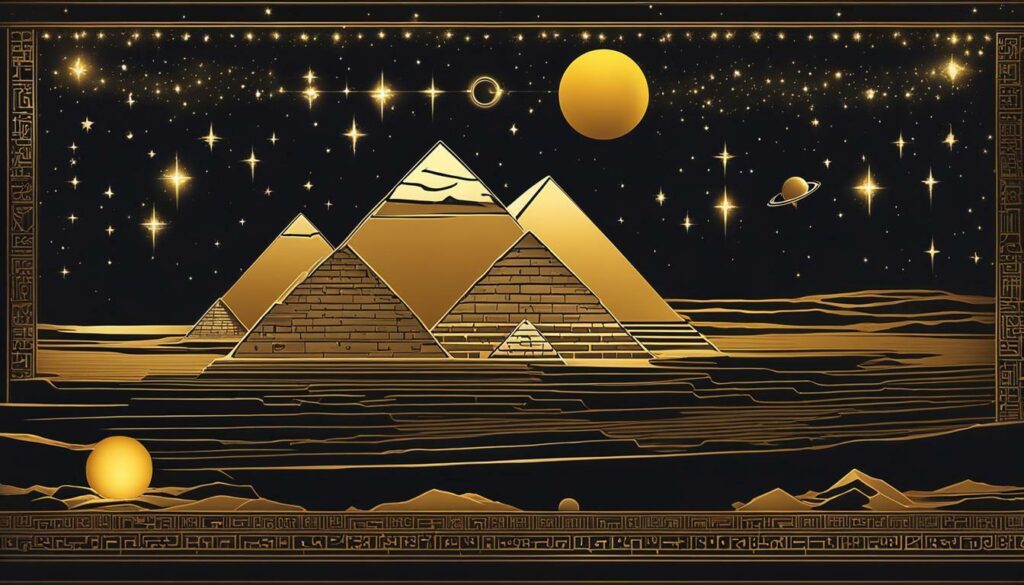
“The stars and planets were viewed as powerful symbols of divinity and were revered in ancient Egyptian culture.”
Celestial Deities in Ancient Egypt
Ancient Egyptians believed in a pantheon of gods, many of whom were associated with celestial phenomena. These celestial deities held immense power and were revered in ancient Egyptian religious practices.
Nut, the goddess of the sky, was one of the most prominent celestial deities. According to ancient Egyptian mythology, she was the mother of the sun god Ra and the moon god Khonsu. Her body was believed to arch over the earth, creating the sky that enveloped it. Ancient Egyptians believed that every night, Ra would travel through her body, and every morning, he would be reborn.
“Nut is the sky, she is the firmament, she is the distance that separates heaven from earth, and she is the guardian of Egypt’s celestial realm. She is the mother of Ra, and without her, there would be no sun or moon.”
Thoth, the god of wisdom and knowledge, was closely associated with celestial phenomena as well. He was believed to have created the calendar and was responsible for maintaining the balance of the universe. Ancient Egyptians believed that he was the mediator between the other gods and the mortal world.
Horus, the god of the sky, was another important celestial deity. He was often depicted with the head of a falcon and was believed to be the protector of the pharaohs. Ancient Egyptians believed that his eyes were the sun and the moon, and that he controlled their movements across the sky.
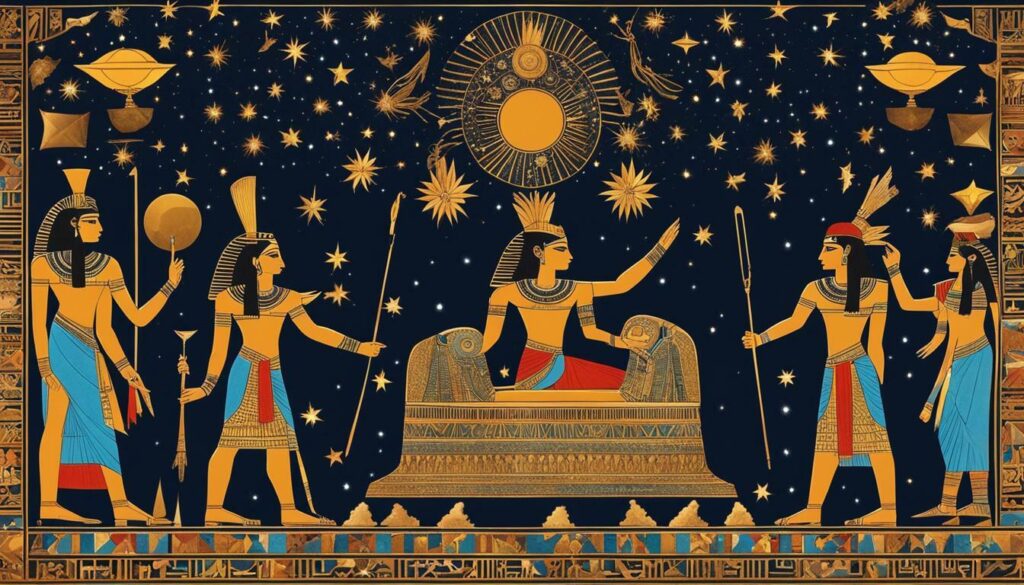
Ancient Egyptian religious practices involved the worship and offerings to these celestial deities, along with others. Temples were constructed in their honor, and rituals and festivals were held in their names. Their belief in celestial deities helped shape their understanding of the world and their place within it.
Aligning Temples with Celestial Events
Ancient Egyptians strongly believed in aligning their temples with celestial events as part of their religious practices. The alignment of temples was crucial to ancient Egyptian cosmology since they believed that the gods resided in the heavens. Therefore, aligning temples with celestial events was believed to provide a direct connection to the divine realm.
Ancient Egyptian religious practices strongly influenced the design of temples, and the alignment was no exception. The layout of many temples was based on the position of celestial bodies, and priests carefully observed the heavens to determine the exact orientation of the temple.
The Temple of Karnak, for example, was designed to align with the winter solstice. During this time, the sun would shine directly into the temple’s sanctum, illuminating the statue of the god Amun-Ra. This alignment was believed to signify the rebirth of the sun god, reinforcing the ancient Egyptian belief in the cyclical nature of life.
The Temple of Abu Simbel was another significant temple whose layout was based on celestial events. The temple’s inner sanctuary was designed to align with the rising sun on two specific days of the year – the king’s birthday and the anniversary of his coronation. These alignments symbolized the king’s connection to the gods and the sun’s rejuvenating power.
Overall, the alignment of temples with celestial events was an integral part of ancient Egyptian religious practices and architecture. The precise orientation of temples was believed to provide a direct connection to the divine realm, reinforcing their belief in the significance of celestial bodies and their influence on daily life.
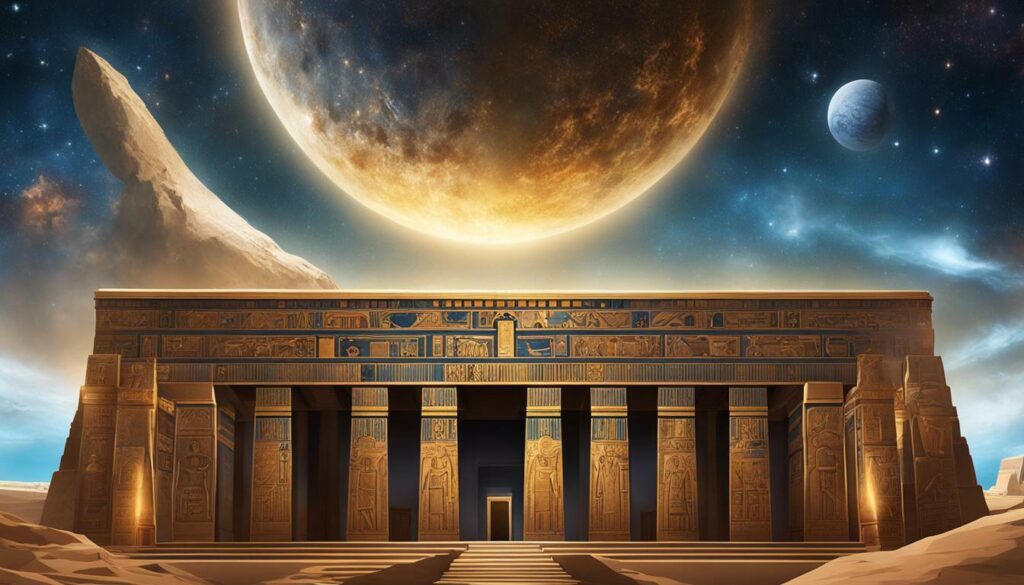
Ancient Egyptians were known for their advanced understanding of astronomy and the use of celestial knowledge in their daily lives. Their astronomical observations played a significant role in their religious practices, agriculture, and navigation.
Astronomy played a vital role in religious practices and ceremonies. Ancient Egyptians believed that the movements and positions of celestial bodies were connected to the actions of their deities. For example, the rising of the star Sirius, which marked the beginning of the inundation season, was associated with the goddess Isis and was a significant event in the religious calendar.
Furthermore, astronomical knowledge was also used to determine agricultural practices. The ancient Egyptians used celestial observations to anticipate the annual flooding of the Nile, which was essential for irrigation and successful crop yields. They also used celestial calendars to track the seasons and the movements of the stars to determine the best time for planting and harvesting.
Lastly, ancient Egyptians used celestial knowledge for navigation. They used the stars to navigate the Nile River, desert trade routes, and the seas. Even the design of the ancient Egyptian ships was influenced by their understanding of celestial navigation.
The ancient Egyptians’ advanced knowledge of astronomy and the use of celestial knowledge in their daily lives were essential to their civilization’s survival and prosperity. Their observations and practices continue to inspire and influence modern understanding of astronomy and its connection to culture and society.
Ancient Egyptian Astronomy and Religious Practices: A Fascinating Legacy
“The Egyptians possessed a knowledge of the heavens and the heavenly bodies which was unparalleled in antiquity and rivaled only by the later Greeks.”
The use of celestial knowledge in ancient Egyptian daily life is a testament to their value and appreciation of the cosmos. Their advancements in astronomy and its integration into their culture have left a lasting legacy that continues to fascinate and inspire to this day.
Conclusion
Exploring the celestial beliefs of ancient Egypt has revealed a complex and intricate understanding of the universe. The ancient Egyptians believed the stars and planets were significant in their culture, religion, and daily life.
They developed an elaborate cosmology and astronomy through their observations and interpretations of celestial phenomena. Their beliefs in celestial deities and astrology also significantly influenced their religious practices.
The alignment of temples with celestial events and the incorporation of celestial knowledge in daily life further emphasize the importance of celestial beliefs in ancient Egypt.
Overall, the study of celestial beliefs in ancient Egypt highlights the sophistication and sophistication of their civilization. It also underscores the enduring legacy of their beliefs, which have left an impact on the world that persists today.



